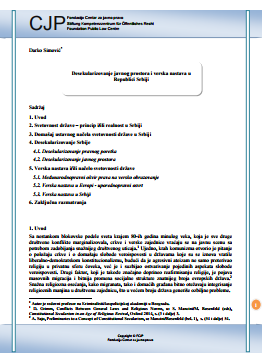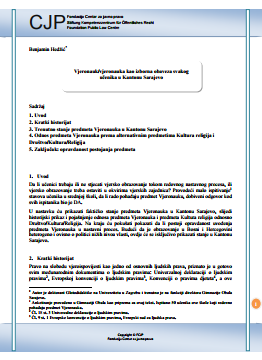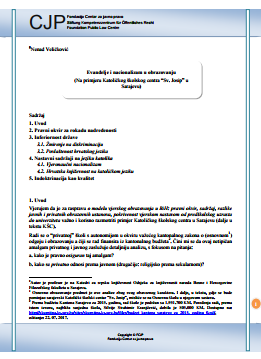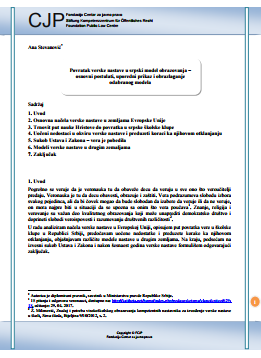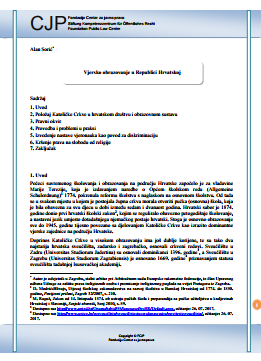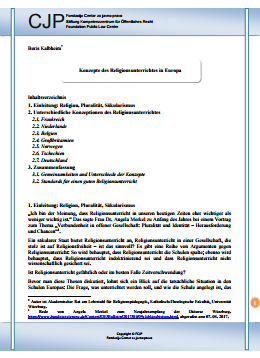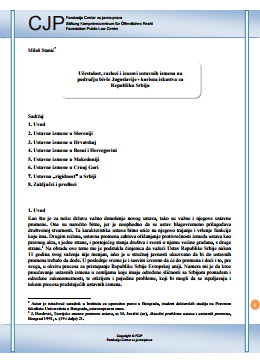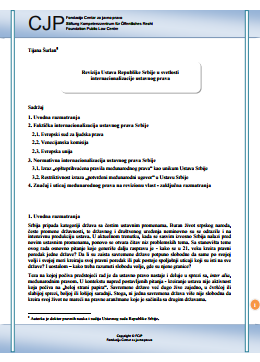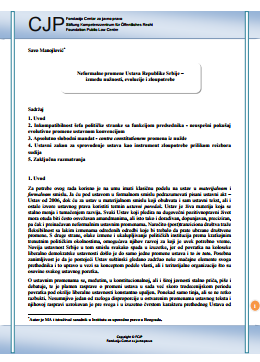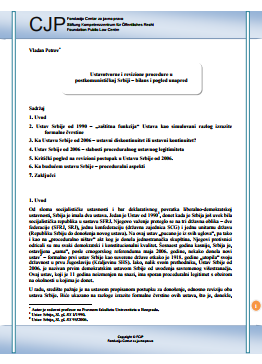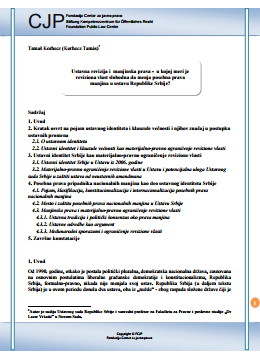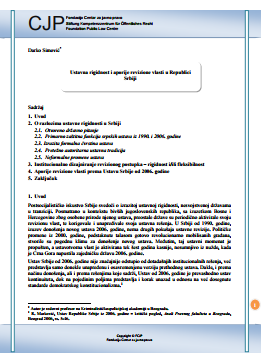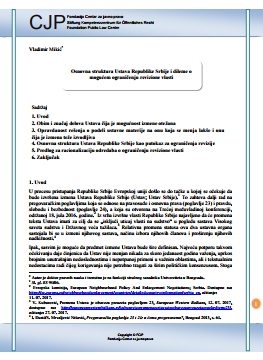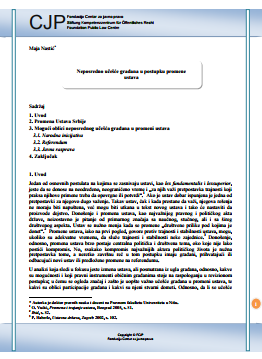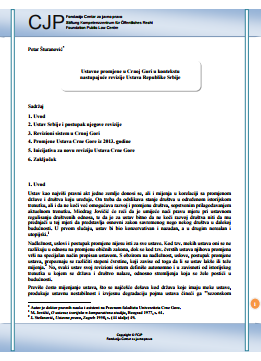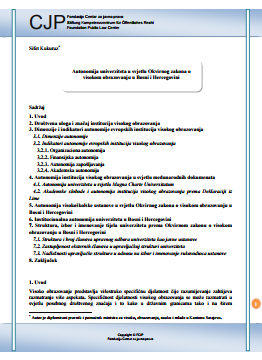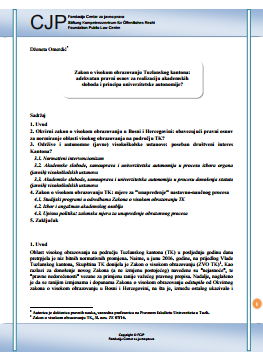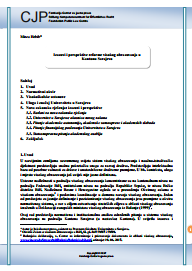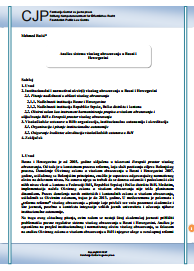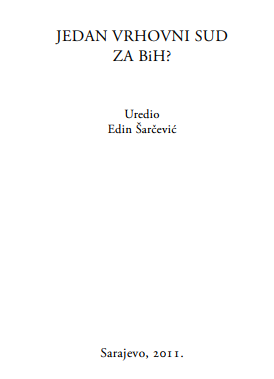Povratak verske nastave u srpski model obrazovanja – osnovni postulati, uporedni prikaz i obrazlaganje odabranog modela
Author(s): Ana Stevanović / Language(s): Serbian
Keywords: Public law; education; religious education; Republic of Serbia; education model; review;
Verska nastava je prisutna u školskom sistemu u Republici Srbiji, u kontinuitetu, već šesnaest godina. Ustav Republike Srbije definiše našu državu kao svetovnu. Iz toga proizilazi da je i sistem obrazovanja sekularan. Način održavanja verske nastave, po mom mišljenju, ne krši sekularnost države. Ne postoji državna religija, već sistem „kooperativne razdvojenosti“. Smatram da je hrišćanstvo progresivno kreaciona religija, koja smatra da je Bog stvorio sve, da svet evoluira, ali pod nadzorom nadprirodnog kreatora, a da je nauka tu da stvara slobodne ljude i perspektivno, tolerantno i moderno društvo. Kako je izbor na versko obrazovanje izboran, a ne obavezan, ne smatram da dolazi do ugrožavanja naučnog pogleda na svet kod dece, niti da će Srbija dati prednost religijsko-konzervativnim vrednostima u odnosu na vrednosti modernog sveta. Deca imaju mogućnost gledanja šire slike i prava na izbor. Nema ničeg retrogradnog u poznavanju religije. Na ovaj način se omogućava kvalitetnije obrazovanje, unapređuje demokratsko društvo i doprinosi slobodi veroispovesti. U skladu sa iznešenim uočenim nedostacima u okviru verske nastave smatram da je potrebno, kako bi se verska nastava na najbolji način obavljala, programe Pravoslavnog katihizisa i programe ostalih verskih zajednica stalno osvežavati i unapređivati, a sve kako bi se obezbedilo ostvarivanje predviđenih ciljeva. Iskustva u višegodišnjoj realizaciji pokazuju da su najveće intervencije potrebne u programima za prvi ciklus osnovne škole, budući da se postavljeni zahtevi programa teško ostvaruju. Reviziju programa bi trebala da obavlja posebno formirana Komisija ili grupa, kojoj bi to bila glavna nadležnost. Takođe je važno uskladiti udžbenike sa stučnim stavovima veroučitelja, kako bi što jednostavnije preneli đacima svrhu verske nastave. Pogrešan sadržaj programa vodi brojnim problemima. Dozvoliti veći stepen slobode za nastavnike i učenike u izboru dela tema koje će obrađivati bi bilo višestruko korisno i proizvelo veću zainteresovanost. Prema rezultatima samoprocene nastavničkih kompetencija zaključujem da je veroučiteljima najviše pomoći potrebno kada su u pitanju kompetencije za nastavnu oblast, predmet i metodiku nastave i kompetencije za poučavanje i učenje. Prioritet su teme razvoja metodičkih znanja i veština u radu sa učenicima. Takođe, kao i što sam već navela, neophodno je obezbediti kontinuirana usavršavanja veroučitelja i to u sklopu fakulteta kao što su: učiteljski, pedagoški i filozofski. Potrebno je raspisati konkurs za izbor primera dobre prakse u nastavi Pravoslavnog katihizisa, koji će biti objavljeni u formi priručnika za nastavnike, kao i obezbediti da izabrani primeri budu dostupni svim školama i nastavnicima. Koordinatori ove aktivnosti mogu da budu Zavod za unapređivanje obrazovanja i vaspitanja. Mišljenja sam da se verska nastava nalazi na ozbiljnom i teškom ispitu. Potrebno je prevazići iskušenja zajedničkog života i rada, obrazovanja i vaspitanja, a sve radi uvođenja đaka u život crkve. Nesumnjivo je da će verska nastava itekako imati uticaja na moralno vaspitanje mladih, a da bi pozitivni efekti postojali potrebno je kontinuirano unapređivati procese realizacije nastave ovog predmeta, kao i usavršavati pedagoške i teološke kompetente veroučitelja. Takođe, Srpska Pravoslavna Crkva i ostale tradicionalne crkve i verske zajednice treba da se u većoj meri uključe u rad komisija Ministarstva prosvete, nauke i tehnološkog razvoja koje su posvećene verskoj nastavi. Odgovornost za poboljšanje verske nastave nije samo u resornom ministarstvu, već i u crkvi.
More...
